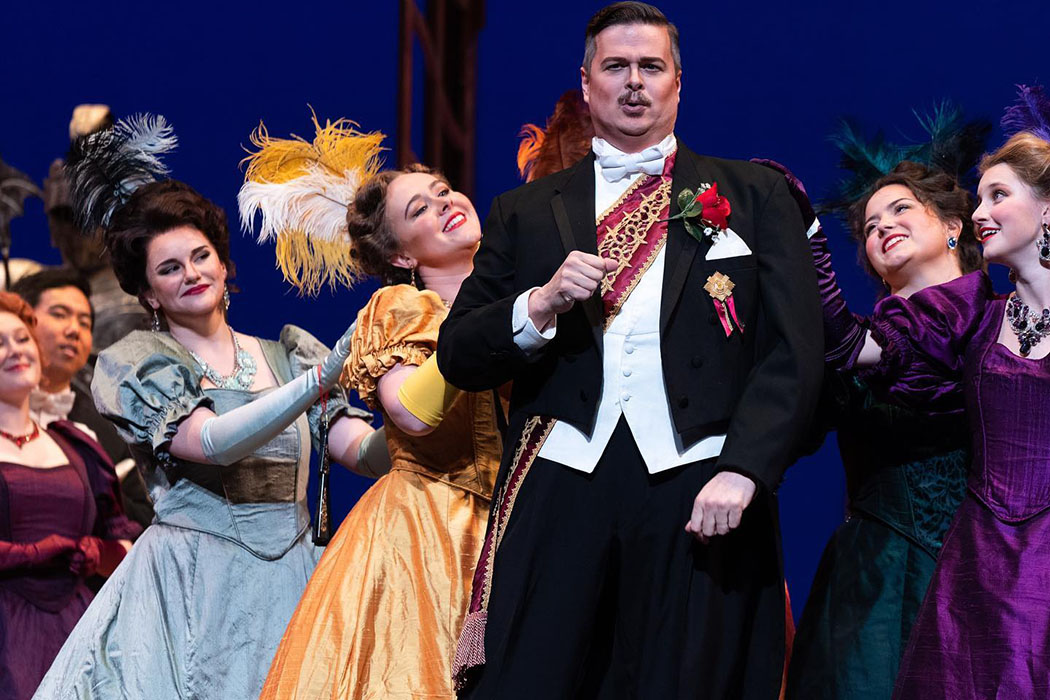There was a lot to grab one’s attention last Friday evening at Knoxville Opera’s production of the Franz Lehar operetta, The Merry Widow. History buffs got a peek at the influence operetta has had on our own American musical theatre. Lovers of catchy tunes were no doubt enchanted with familiar melodies like Hanna’s “There lived a Vilja, a maid of the woods,” Count Danilo’s “You’ll Find Me at Maxim’s,” or the irresistible “Merry Widow Waltz.” Theatre-lovers were delighted with the simple, but elegant original set that eschewed rented backdrops for eye-catching art nouveau details. Orchestral fans of the Knoxville Symphony Orchestra were enchanted with the ensemble’s decidedly first-rate performance in the pit. And, everyone, both audience and performer, seemed happy to be back in the Tennessee Theatre, even if the soprano did not die of heartbreak, nor a tenor fall on his sword.
It is worth stipulating upfront that operetta, just like its heavier and grander cousin, requires accepting stylistic forms and premises that are anything but realistic. The juxtaposition of spoken dialog with songs—the essence of what musical theatre is even now—can also present issues of projection and diction for singers not used to delivering crisp spoken dialog.
It should also be mentioned that time and circumstances have altered the libretti of most operettas, certainly including The Merry Widow. Various translations into English have tweaked meanings and made for awkward rhyme schemes and cadences. Plot points no longer relevant have been traded in for contemporary references, while timely alterations to suit opera gala occasions have manufactured situations to suit particular audiences.
That said, this Merry Widow production by KO stage director Dean Anthony seemed to be the currently accepted English version, offering up an entertainment that was snappy, clever, colorful, and fun. Anthony moved his principals around the stage with boldness, letting comic snapshots and bursts of song punctuate the rhythm. At the same time, the stage crowd scenes bubbled with an effervescent quality, so visually intoxicating that one found it difficult to identify who was who in the secondary roles.

This production also saw a more obvious and relevant collaboration between Knoxville Opera and the University of Tennessee Opera Theatre, where seasoned performers—some already familiar to Knoxville audiences—took the lead roles and UTOT singers took the all-important secondary, dancer, and chorus roles.

Perfectly cast in the title role, that of the wealthy young widow Hanna Glawari, was soprano Susannah Biller. Her Hanna was confident and bright comedically, appropriately sadder-but wiser in the ways of romance. Not surprising, though, one could barely wait for her vocal numbers which treated the audience to a deliciously attractive mid-range that soared and a beautiful clarity in her high notes. As noted previously, her “There lived a Vilja, a maid of the woods” was simply hypnotic.
Opposite Biller in the role of Count Danilo was baritone Sean Anderson, a singer being welcomed back by Knoxville Opera for his seventh appearance. Anderson has the ability to command a stage—both dramatically and comically—with his presence and vocally with his rich, sumptuous baritone that carries the music along. He gave his Danilo a character that teased with a “man-about-town” swagger that one learned was something of a facade hiding the real, ethical-in-love Danilo.
Baritone Gary Simpson as Baron Zeta obviously knows The Merry Widow very well, having sung in the cast of the Metropolitan Opera’s production that was first presented on New Year’s Eve of 2014 and had 23 subsequent performances over three years. As the ambassador, Simpson’s Zeta seems to be on top of everything at the Pontevedrin embassy, except the mere fact he is being unwittingly cuckolded by his charming wife Valencienne. Simpson’s Zeta is both the good-natured bumbler and the outraged husband in whose hands the financial fate of his homeland of Pontevedro depends.
Like Anderson, Donata Cucinotta is not new to roles with Knoxville Opera. As the cute Valencienne, she brought both her flair for physical and vocal comedy and a soprano voice that surprises with its clarity and power. Her partner in a romantic affair is the handsome and insistent Count Camille de Rosillon, sung by tenor John Riesen.
The ambassador’s right-hand man—and comic relief in the production—is Njegus, taken here by tenor Gregory Sliskovich. Knowing everyone’s secret and burdened with the task of parceling out solutions at the right moment, Njegus is a plum role for the substantial comic and vocal talents of Sliskovich. His aria “I am a Parisian” is yet another of the tuneful and unforgettable side moments that give this operetta its comic heft.
As mentioned above, the KSO in the pit under UTOT conductor Kevin Class played brilliantly, providing just the right balance of poignant string schmaltz with lilting tunefulness, and Lehar’s colorful and bouncy woodwind and brass punctuations.
On the visual side, the set design (Jefferson Ridenour) and lighting design (John Horner), was fundamental in making this production so eye popping and likable—and for allowing the costume designs (Glenn Avery Breed), particularly the Act II Balkan-flavored folk outfits and the Act III Can-Can, to overwhelm and delight.
Without doubt, The Merry Widow as operetta music theatre is important because we continue to value points in time that we pleasantly imagine and that bring a smile—and music that sticks in our heads, not from the seriousness, but from the complete lack of seriousness. Thanks to Knoxville Opera for reminding us of this very important fact.








